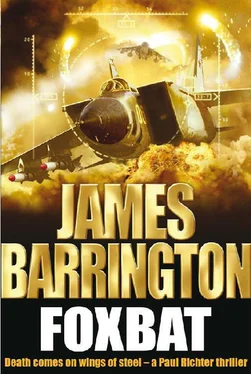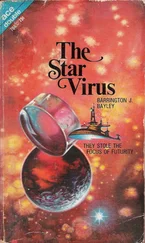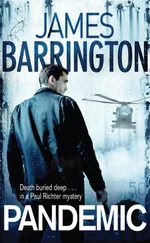‘It’s just a paperwork problem,’ Adashev blustered, returning to the tune he’d been playing since this interview began. ‘The fault lies at Zaporizhia, and if you do your job properly that’s where you’ll go next.’
Yershenko shrugged. Ultimately, it wasn’t his problem anyway. He’d simply write up his report of the inspection, highlight the discrepancy and pass the buck to Moscow. But he would certainly visit the maintenance facility. The colonel might be right and, if only for the sake of completeness, the inspection team would have to investigate his claim.
‘We’ll be flying straight to Zaporizhia when we leave here.’
Adashev nodded. ‘You might like to send a preliminary report through our communication facilities?’
‘No thank you. Until we locate those two missing aircraft, it would be premature to contact Moscow. I’ll file a complete inspection report once we’ve checked the records at Zaporizhia.’ And he could have added: I’ll file my report when there’s no possibility of it being altered or delayed. In fact, he’d already telephoned his superior in Moscow with a brief outline of what had been discovered at Letneozerskiy.
Adashev stood up and extended his hand across the desk. ‘I probably won’t be seeing you again, Colonel, so I’ll say goodbye now.’
After a moment’s hesitation, Yershenko shook it, then turned and left the office.
The moment the door closed behind him, Adashev made a three-minute phone call to a trusted subordinate.
Seoul, South Korea
In a third-floor conference room at the National Intelligence Service headquarters at Naegok-dong, two men in shirtsleeves sat either side of a long table. Between them was a professional-quality reel-to-reel tape recorder hitched to an external amplifier and a pair of small speakers. A cassette player would have been far more convenient, but Bae Chang-Su – the autocratic head of the NIS – had insisted on the best possible audio quality, and that meant using the original tape and the Revox.
They’d played the recording four times already, and Bae knew they’d soon have to make a decision about what to tell the Americans.
‘What did his previous reports contain?’ he asked.
Kang Jang-Ho was Bae’s direct subordinate and also Yi Min-Ho’s briefing officer, since the infiltration of the NIS agent into North Korea had been sanctioned at the highest level. He now referred to his notes.
‘He only made two brief calls, and there was nothing particularly significant in either. Yi contacted us once to confirm that he’d landed, and again after he had established his observation point overlooking the airfield. His only concern was that he’d almost been caught by an army patrol near Ugom, and he had the feeling they were deliberately waiting for him. Their truck had been parked on the road without lights and drove straight towards him as he came into view.’
‘Do you give any credence to his suggestion that they knew in advance?’
‘No, sir, I don’t. There’s always a heavy military presence in that area, so I think he just ran into a regular patrol that spotted someone suspicious and gave chase. The other possibility is that North Korean radar detected the inflatable heading for the coast, but I think that’s unlikely.’
‘Perhaps,’ Bae grunted. ‘What’s your assessment of the situation now? Is Yi still alive?’
‘Probably not. His last message’ – Kang gestured at the tape recorder – ‘suggests that he’s been captured at the very least.’
He referred to his notes again. ‘I’ve had the recording analysed by our technical staff. First, it’s definitely Yi’s voice: the voice-print analysis is unambiguous. Second, he’s shouting and there are traces of panic in his voice, as he’s clearly desperate to pass on a message to us. That could mean he was on the run. Third, there are the six shots heard at the beginning of the tape. Because of the volume of these explosions, the technicians believe the weapon was fired close to the Kyocera, meaning they were fired from Yi’s own pistol, at whoever was pursuing him.’ Kang glanced at his superior before continuing.
‘And, at the very end you can hear the sound of other, more distant, shots, immediately before Yi’s transmission ends. They must have been fired by his pursuers, and we have to assume that one of the bullets damaged the satellite phone, because the signal disappears immediately afterwards. We tried calling the unit several times over the next hour, but each time the system reported the Kyocera unavailable. It was then, following COMSEC procedures, recorded as destroyed and the number barred. So we believe Yi must have seen something so important that he ignored standard operating procedure by breaking communications silence in an attempt to call us.’
‘And what about the message he tried to pass on?’ Bae demanded.
Kang lifted his hands in a gesture of helplessness. ‘All he says is that the North Koreans have new aircraft – then he was cut off. We don’t know exactly what he meant by that, but must assume he saw something sufficiently unusual to risk calling us immediately.’
For a few moments Bae stared at the Revox as if willing it to supply the answer. Then he shifted his gaze back to his subordinate.
‘I’m not prepared to risk sending another agent across the border, so I think it’s time to involve the Americans formally. We’ll just report what little we have, and see what they can do with their technical assets. Perhaps one of their satellites will be able to identify whatever aircraft Yi observed at T’ae’tan, and then we’ll have a better idea what we’re up against.’
Perm, Russia
There are a lot of bars in the city of Perm, catering for everyone from the habitual drunk to the purely social drinkers who have a need to be seen in the right place, at the right time, and with the right people. The Bar Sputnik fell somewhere between these two extremes. It was located down by the Kama river, identified by an illuminated sign showing a silver ball with four trailing antennae – representing the first-ever Earth-orbiting satellite – and with its tinted windows further darkened by years of tobacco smoke. Most of its clientele were working men, but with a sprinkling of young professionals: administrators, accountants and lawyers in the main.
Stools topped with faded red leather faced the long wooden bar, booths with fixed wooden tables lining the walls opposite, and a handful of tables and chairs occupied the open space just to the left of the street door.
At one of these tables, four men sat talking and drinking. One was young, maybe twenty-five years of age, slim, with fair hair and blue eyes. Two of his companions were late middle-aged and, more typical of most of the population in the area, had dark hair, brown eyes, flat, almost Slavic, features and bulky physiques. The fourth man, short, thin and somewhat older, looked almost oriental by comparison.
To any interested observer, the elderly man would have seemed the dominant personality. His name was Ryu Chang-Ho and he’d arrived in Perm just over two weeks earlier. When he spoke, he was listened to in respectful silence, and was clearly used to conducting life on his own terms.
For the most part, their discussion appeared amicable, though when Ryu made a suggestion, the other three quickly nodded agreement. But then the atmosphere at the table suddenly changed. Ryu leant forward and addressed the young man in a low, determined voice, and for the first time Georgi Lenkov showed signs of dissent.
He shook his head firmly. ‘I will not do that,’ he replied in Russian. ‘I am not a traitor.’
Ryu leant even closer. ‘I’m not asking you to do anything that would compromise your country,’ he insisted. ‘All I’m doing is offering you a substantial reward in exchange for your professional services.’
Читать дальше












